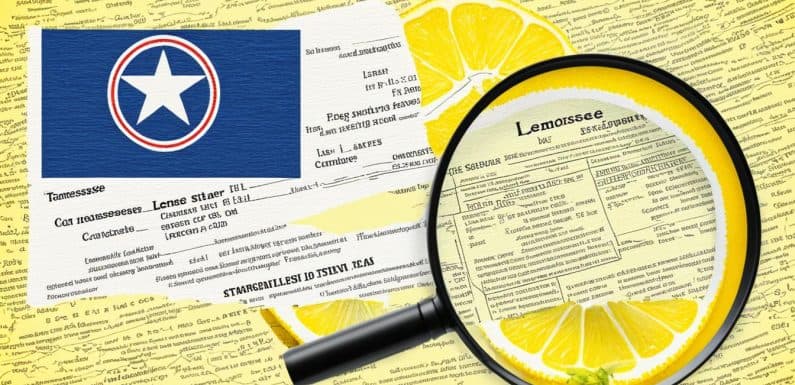
The Tennessee Lemon Law provides a remedy for consumers who purchase or lease defective vehicles, ensuring their rights are protected. It defines a ‘nonconformity’ as a defect or condition that substantially impairs the vehicle’s use, value, or safety, thereby making it unreliable or unsafe for normal operation. This consumer protection law mandates that manufacturers must address any reported nonconformities within the vehicle’s warranty term or the first year following delivery. Should the manufacturer be unable to repair the vehicle adequately after a reasonable number of attempts, they are required by the Tennessee lemon law to either replace or repurchase the afflicted vehicle, offering much-needed relief for owners of defective vehicles.
Key Takeaways
- The Tennessee Lemon Law stands as a safeguard for consumers against defective vehicles.
- A ‘nonconformity’ under the law is any defect that significantly impairs the vehicle’s performance or safety.
- Manufacturers must attempt to fix any defects reported within the warranty period or the first year after delivery.
- If the issue persists after a reasonable number of repair attempts, the law dictates the vehicle be replaced or repurchased.
- The lemon law emphasizes consumer awareness and fosters relief for those stuck with defective vehicles.
What is the Lemon Law in Tennessee
Navigating the intricate details of the Tennessee lemon law can be challenging. However, understanding your rights is crucial if you suspect your vehicle qualifies for lemon law protection. This section will guide you through the essential criteria, outline any exclusions, and clarify what constitutes a reasonable number of repair attempts.
Criteria to Qualify for Lemon Law Protection
To qualify for lemon law protection in Tennessee, certain conditions must be met. Firstly, you must report any substantial nonconformity to the manufacturer or their authorized agent during the warranty period, or within a year from the delivery of your vehicle. The nonconformity must significantly impair the vehicle’s use, safety, or value. Documenting each complaint and the corresponding repairs is vital as this record will serve as your evidence should you need to seek recourse under the lemon law.
Exclusions and Consumer Responsibilities
There are specific exclusions within the Tennessee lemon law that are important to note. Issues that do not seriously affect the vehicle’s performance, safety, or value do not qualify. Additionally, problems resulting from consumer abuse, neglect, or unauthorized modifications are not covered. As a consumer, you are responsible for reporting defects promptly and accurately. You are also responsible for cooperating with the manufacturer during the repair process, including delivering the vehicle for repairs as requested.
“Reasonable Number of Attempts” Explained
A pivotal component of the lemon law is the definition of a reasonable number of attempts. In Tennessee, this means that if your vehicle’s issue persists after three or more attempts to repair the same problem, or if your vehicle has been out of service for repairs for more than 30 cumulative business days, you may be entitled to relief. This threshold establishes the basis for demanding a replacement or repurchase, putting the burden on manufacturers to rectify substantial nonconformities swiftly and effectively. Compliance with this stipulation is often the determining factor in asserting your lemon law rights successfully.
| Qualification Criteria | Exclusions | Consumer Responsibilities |
|---|---|---|
| Defect reported within warranty or 1 year of delivery | Issues from abuse or neglect | Prompt defect reporting |
| Substantial impairment of use, safety, or value | Problems due to unauthorized modifications | Accurate reporting of issues |
| Occurrence within a reasonable number of repair attempts | Minor nonconformities not affecting performance | Cooperation during repair processes |
Remedies and Compensation Under the Lemon Law
Under the Tennessee lemon law, consumers have defined paths for resolution when they encounter persistent issues with their vehicles. When manufacturers cannot repair a nonconformity after a reasonable number of attempts, they are obligated to offer remedies to the car owner. These remedies under lemon law include both replacement and repurchase options, tailored to restore equity to the consumer impacted by a lemon vehicle.
Replacement under the Tennessee lemon law involves the manufacturer providing a comparable new vehicle. The replacement vehicle should match the originally defective one as closely as possible, in terms of features and value. Meanwhile, repurchase entails the manufacturer refunding the full purchase price plus other collateral charges, effectively compensating the consumer for the defective vehicle, a tenet central to compensation for lemon vehicles.
- Option to replace or repurchase the faulty vehicle
- Full reimbursement of the purchase price for repurchases
- Provision of a comparable new vehicle for replacements
Consumers should take note that manufacturers may be entitled to a usage fee deduction from the refund, proportionate to the mileage covered before the first defect report. Although this may impact the total compensation for lemon vehicles, it is structured to account for the value the consumer received before the onset of issues.
Before initiating legal proceedings, Tennessee encourages car owners to pursue an informal dispute settlement, such as arbitration. This step is often a pre-requisite, designed to offer a simpler and faster resolution than a court trial could provide, potentially saving both parties time and resources.
In summary, the Tennessee lemon law enforces measures to ensure consumers are not left disadvantaged by purchasing a defective vehicle—stipulating clear courses for resolution and emphasizing the importance of fair compensation for lemon vehicles. Awareness of these options empowers consumers to seek the justice and remedies they deserve.

The Arbitration Process and Legal Actions
Before a consumer in Tennessee can initiate legal actions for lemon law claims, they must first engage in an arbitration process. This procedure serves as a prerequisite, offering a faster and less formal route for dispute settlement compared to the court system. In arbitration, an impartial arbitrator is appointed to review evidence, listen to both parties, and make a decision. This decision is typically binding for the manufacturer, creating a legal obligation to comply. However, consumers retain their right to seek further recourse in the legal arena if the arbitration outcome does not resolve their concerns.
When diving into legal actions, it’s crucial for consumers to understand that the court can be a valuable arena for those dissatisfied with the arbitration outcome. Should the arbitration not yield a favorable result, consumers retain the option to file a civil lawsuit against the manufacturer. Undertaking this course of action often involves more stringent procedures and possibly a longer time frame. However, it provides a platform where evidence and legal arguments can be considered more deeply, potentially leading to a comprehensive examination of the lemon law claims in Tennessee.
The journey doesn’t end there for consumers who are contemplating legal actions. It’s recommended to seek representation from experienced lemon law attorneys who specialize in this area. These legal professionals provide guidance through complex litigation and may enhance the chances of a successful outcome. Notably, if the consumer prevails in court, there may be a provision for the recovery of attorneys’ fees from the manufacturer. Thus, the arbitration process and potential legal actions provide structured pathways for consumers to seek justice and enforce their rights under the Tennessee lemon law.
